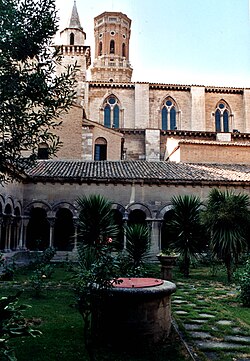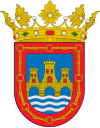Tudela, Navarre
| Tudela | |||
|---|---|---|---|
| Municipality | |||

|
|||
|
|||
| Location in Spain | |||
| Coordinates: 42°03′55″N 1°36′24″W / 42.06528°N 1.60667°W | |||
| Country |
|
||
| Autonomous community |
|
||
| Province | Navarra | ||
| Comarca | Ribera Tudelana | ||
| Judicial district | Tudela | ||
| Government | |||
| • Mayor | Eneko Larrarte (Izquierda-Ezkerra) | ||
| Area | |||
| • Total | 215.7 km2 (83.3 sq mi) | ||
| Elevation | 264 m (866 ft) | ||
| Population (2015) | |||
| • Total | 35,388 | ||
| • Density | 160/km2 (420/sq mi) | ||
| Demonym(s) | Tudelanos | ||
| Time zone | CET (UTC+1) | ||
| • Summer (DST) | CEST (UTC+2) | ||
| Postal code | 31500 | ||
| Website | Official website | ||
Tudela is a municipality in Spain, the second largest city of the autonomous community of Navarre. Its population is around 35,000. The city is sited in the Ebro valley. Fast trains running on two-track electrified railways serve the city and two freeways (AP 68 and AP 15) join close to it. Tudela is the capital of the Ribera Navarra, the agricultural region of lower Navarre.
The poet Al-Tutili, the 12th-century traveler Benjamin of Tudela, the 13th century writer William of Tudela and the physician and theologian Michael de Villanueva were from the city. The city hosts an annual festival in honor of Santa Ana (mother of the Virgin Mary) which begin on 24 July at noon and continue for approximately a week. Street music, bullfights and the running of the bulls are typical events of the festival.
Archeological excavations have shown that the area of Tudela has been populated since the lower paleolithic era. The town of Tudela was founded by the Romans on Celt-Iberian settlements. Since then the town has been inhabited continuously. The Roman poet Marcus Valerius Martialis (Epigrams Book IV, 55) "recalls in grateful verse" the town of Tutela compared to his native Bilbilis. The city was later taken by the Arabs during the Umayyad conquest of Hispania and became the Muslim emirate of Al-Hakam I in 802 under Amrus ibn Yusuf al-Muwalad.
At the beginning of the 9th century, the strategic importance of Tudela as a site on the river Ebro was enhanced by historical and political circumstances. It became the base of the Banu Qasi family of Muladis, local magnates converted to Islam that managed to stay independent of the emirs, establishing an on-off alliance and close ties with the Kings of Pamplona over the next century. With the power of the Banu Qasi fading at the onset of the 10th century, the town fell under the influence of the rising Caliphate of Córdoba and had to come up against a more aggressive policy on the part of the new dynasty ruling in Pamplona, the Ximenes, who had set up close ties with their neighbouring Christian kingdoms.
...
Wikipedia



